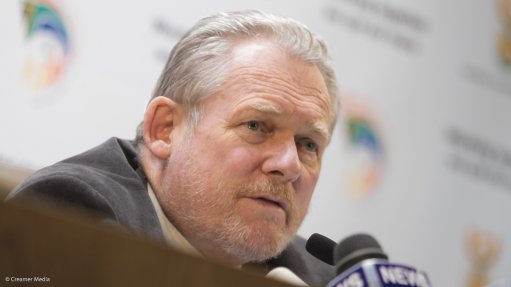
Mininster Dr Rob Davies
Photo by: Duane Daws
The global slowdown in trade has a disproportional impact on developing countries, given the relative size of their economies and consequent heavy reliance on international trade, Trade and Industry Minister Dr Rob Davies said on Wednesday.
This was in light of the recent meeting of G20 Trade Ministers, held in Istanbul, Turkey, where delegates discussed the slowing global trade.
The meeting focused on how multilateral trading systems could work better, the implications of the global trade slowdown for the future of trade and policy options to further integrate small- and medium-sized enterprises into global value chains.
“Developing countries are facing the harsh impact of declining commodity prices and falling export demand that are attributable to a global trade slowdown.
“Added to this, financing pressures are becoming more acute and are expected to remain so for an extended period of time. Access to private trade finance has become hard to come by and the prospects for foreign direct investment, in particular, will be challenging over the foreseeable future,” Davies noted.
He added that the United Nations Conference on Trade and Development 2014 report also confirmed that the rate of income growth in developed economies since 2008 was significantly lower than it was prior to the global economic crisis, and that statistical evidence also pointed to a considerable weakening of import elasticity of demand in these countries.
Davies indicated that trade needed to support industrial development, particularly in developing countries, and should be seen as part of a wider economic development strategy with accompanying measures.
“Accordingly, trade policies must be strategically aligned with industrial policy objectives. A mix of policies that are critical to achieve a scaled up industrial policy and a shift towards strengthening the productive side of the economy are required,” he added.
The Minister further stated that developed countries could provide support to Africa’s infrastructure drive and to the efforts to stimulate the development of Africa’s regional industrial value chains.
“To enable the countries in Africa to integrate meaningfully into the world economy, it will require infrastructure development and the building of production capacity and capabilities.
“In Africa, we have embarked on a process to build regional development integration through the upgrade of regional infrastructure and productive capacity,” Davies stated.
He further said trade liberalisation failed to deter Africa from relying heavily on exporting primary commodities to the rest of the world, noting that broadening and upgrading the industrial base to encourage production and export of more sophisticated value-added products required purposeful intervention in the industrial economy.